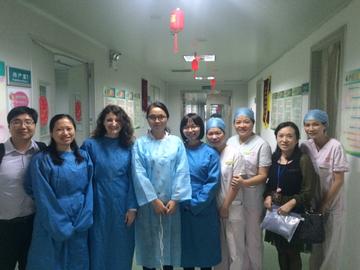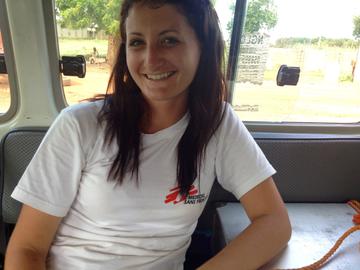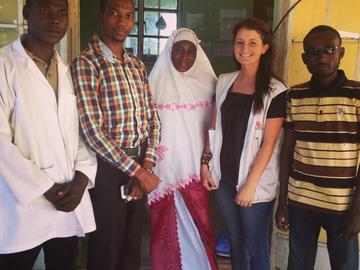Jan. 4, 2023
Researcher awarded Banting Postdoctoral Fellowship for work in infectious disease outbreaks

Dr. Anna Funk, PhD, has felt the rush of adrenaline that comes with travelling to remote areas around the world while investigating infectious disease outbreaks.
Formerly a field epidemiologist with Doctors Without Borders, Funk has worked in Africa, India and the Caribbean in communities struggling with malaria, cholera, meningitis, Zika virus, the pneumonic plague, HIV and other diseases.
“It’s the dream of many infectious disease epidemiologists to investigate outbreaks on the ground, and for me, so early in my career, that was very transformational,” says Funk of her field experience.
She has now switched gears and is a postdoctoral scholar working with the Libin Cardiovascular Institute’s Dr. Amy Metcalfe, PhD, but her passion for understanding the impacts of infectious diseases is still going strong.
She, like many scientists, is now focusing on COVID-19. Her current work is in studying birth outcomes in pregnancies impacted by COVID-19. Funk’s work aims to determine if COVID-19 infection during pregnancy increases the risk of preterm labour and other pregnancy complications.
She recently received a prestigious Banting Fellowship, a federal grant set up to support tomorrow’s research leaders, to aid in this research, being done under the mentorship of the Libin Cardiovascular Institute’s Dr. Amy Metcalfe, PhD, an associate professor whose research focuses on improving health and health care for pregnant individuals.
Metcalfe says it’s critical to evaluate the health impacts of new infectious diseases and their treatment strategies in pregnant people.
“Pregnant people have unique risk factors that often place them at increased risk of having more severe outcomes if infected and are typically not included in randomized clinical trials focusing on vaccinations or treatments,” says Metcalfe. “That means there can be a lot of uncertainty regarding how to prevent and treat infectious disease during pregnancy.
“Dr. Funk has been an incredibly valued addition to our research team. Her knowledge on infectious disease, surveillance and study design is unparalleled.”
Career Journey
Funk’s academic journey started with an undergraduate degree in biomedical sciences at Queen’s University, with the goal of attending medical school. But fate stepped in when the world of epidemiology opened to her while she was enrolled in some community health courses.
“After hearing a lecture during a class, I approached the lecturer and said, ‘I want to do what you do,’” says Funk. “Infectious disease at the population level was what drew me in.”
The lecturer put Funk in contact with someone from the BC Centre for Disease Control, where she ended up getting a summer internship working on flu surveillance and predictions. Through contacts at the organization, Funk went on to do several more internships.
She then headed to the London School of Hygiene and Tropical Medicine to do her masters in the control of infectious diseases. Her master’s studies focused on intestinal parasitic diseases and included fieldwork in India.
Following this work, Funk realized her niche was to study infectious disease in vulnerable populations. She worked as a researcher in several places, including at an HIV research centre in Uganda, within Canada’s prison population, with Doctors Without Borders in northern Nigeria, the Democratic Republic of the Congo, and in refugee camps on the border of South Sudan.
Funk earned her PhD in epidemiology in emerging disease at the Institut Pasteur in France. During her studies, she looked at hepatitis C in Egypt and the impacts of Zika virus on pregnancy outcomes.
“That took me to numerous study sites in the Caribbean, Africa and Asia,” says Funk. “It was a unique and enriching opportunity.”
Several other opportunities followed: Funk worked on pneumonic plague in Madagascar, Middle Eastern Respiratory Syndrome and hepatitis B. She consulted with the World Health Organization and was involved in numerous publications, including this publication in the New England Journal of Medicine and this publication in the Lancet Infectious Diseases.
Funk’s personal life was changing too. Her husband, also an academic, was hired at the University of Calgary in 2019. Funk started her postdoctoral fellowship working with Dr. Steven Freedman, MD, on infectious gastroenteritis in children in late 2019.
In January 2020, while most of the world was still unaware of a life-changing infectious disease on the horizon, Freedman, Funk and their colleagues decided to study COVID-19 in kids. Funk was involved as co-principal investigator in several large international studies, and published key papers on severe outcomes in children and long covid in kids.
Funk has also continued to collaborate with the World Health Organization and has presented on this important work at numerous conferences in Canada, the United States, and Europe.
Pursuing a postdoctoral fellowship studying the impacts of COVID-19 on pregnant people and babies was a natural follow-up for a scientist with interest in understanding and ultimately stopping infectious disease transmission in its tracks.
According to Funk, there’s lots of work to do in this space.
“The reality is that pandemics are going to become more common,” she says. “They are a product of climate change and globalization.”
After witnessing the fear and doubt generated by the pandemic, Funk is also passionate about investigating what goes right and wrong when communicating to the public during outbreaks.
“My aim is to not just comment on what we have seen, but also to investigate how we can best use the robust data we generated during COVID-19 to better handle the next pandemic,” she says.
Amy Metcalfe, PhD, is an associate professor in the departments of Obstetrics & Gynecology and Community Health Sciences at the Cumming School of Medicine at the University of Calgary. She is a member of the Cumming School of Medicine’s Libin Cardiovascular Institute, Alberta Children’s Hospital Research Institute and the O’Brien Institute for Public Health.





